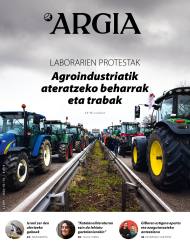The presence in the city walks of a tractor that moves with ease and dexterity in the cornfields, causes a shock of images, an out-of-place device loses its elegance and strength in the city, just as the high-heel shoes lose when you see walking through the mountain. The change of road to the city of the tractor functions, therefore, as a vindictive image, due to the chaos generated by its slow trajectory in urban traffic. Although tractors look large on the streets compared to large passenger cars in cities, greatness does not give them speed as is the case with large passenger cars, nor more safety. The differences in functions between the vehicles report something between the two realities (the city and the countryside), but they do not respond to the classification of the communities “they” and “us”, which are part of a whole, although the urban presence of the tractor clashes with a strange and distant reality. The guide tractor also uses street shoes.
In the city we complain that food prices are high, and the messages from tractors say that they want decent prices for producers. It seems that competition is not played between cities and tractors, but in commercial deals, in another dimension. To demand healthy and sustainable food, we do not need tractors and it is probably more of a market than a supermarket. Let us acknowledge that, once and for all, we must bring the work of the apple producers to the level of the corbatide, dignifying the price of the apple. It is worrying that access to healthy food is possible only through large pockets. I would say that the problem with many small pockets is not the price of the apple, but the price of the house. And that is when the question of tractors begins in a close dialogue with the harsh reality of the city.
Bidali zure iritzi artikuluak iritzia@argia.eus helbide elektronikora
ARGIAk ez du zertan bat etorri artikuluen edukiarekin. Idatzien gehienezko luzera 4.500 karakterekoa da (espazioak barne). Idazkera aldetik gutxieneko zuzentasun bat beharrezkoa da: batetik, ARGIAk ezin du hartu zuzenketa sakona egiteko lanik; bestetik, egitekotan edukia nahi gabe aldatzeko arriskua dago. ARGIAk azaleko zuzenketak edo moldaketak egingo dizkie artikuluei, behar izanez gero.
On 19 March, in the Alondero room in Zestoa, we had an interesting round table on the energy transition organized by the community and renewable energy cooperative Argiola.
The round table was entitled “Energy transition, how?” and for this purpose the organizers invited... [+]
Leaving behind books, libraries and their benefits in April, Kabiak Sahrawi wishes to recall the dark side of his history, which is of greater importance in defending the identity and survival of peoples. We are talking about the destruction of the age-old and usual libraries... [+]
There have also been elections in Catalonia. The Public Journal entitled “Emotions, pragmatism and xenophobia: keys to the Catalan elections”. The left is also in the pragmatic and manager, and emotions were mentioned in relation to Junts. But the discourse against migrants... [+]
I left the child in the room, and I've been dressed for four minutes to realize that I've had to spend twice to realize that I don't have outbreaks of mourning, and that I had been kept as souvenir to wear someone's underpants. I'll just know how to lose that I'm under Spiderman... [+]
I really like science fiction, although in this genre stories are narrated in a very distant way. Using fiction, we work on new ways to explain and/or transform the complex reality we have. Ocativa E. Butler, a science fiction writer, said in an interview that it was very good... [+]












